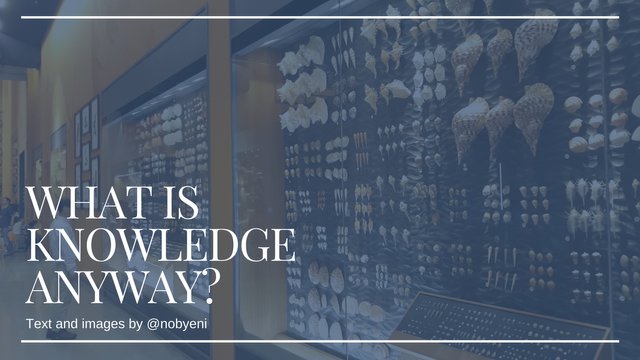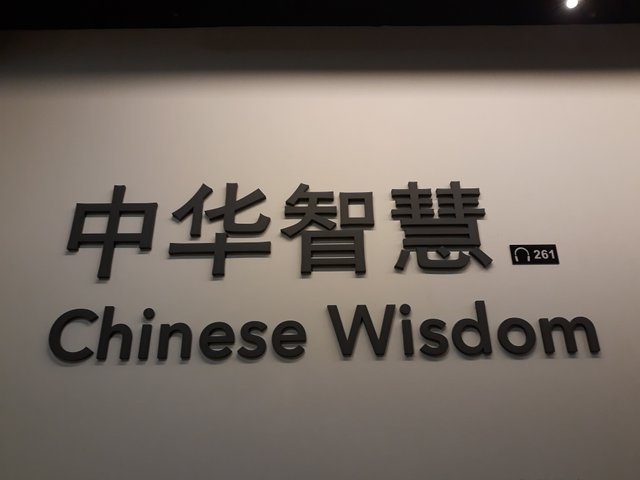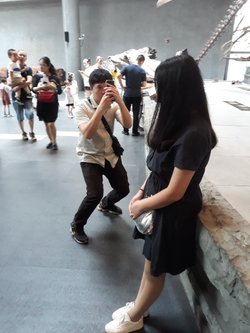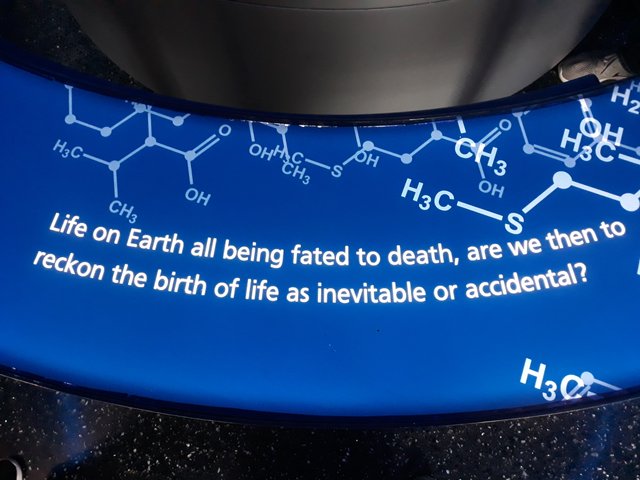What is knowledge anyway? A visit to the Shanghai Natural History Museum
Going to a museum is always interesting. But even more so when you go to a museum in a country very different from your own. I'm in China right now, and as I don't speak Chinese, there are only so many ways to get to know China and the Chinese people. Museums make for a very interesting place to visit. For several reasons. I'll try to show some things I saw today at the Shanghai Natural History Museum to show some of these reasons.

How to present knowledge?
Knowledge is something valued by pretty much everyone, every culture and every nation. Yet what knowledge is, and how to present it to other people to learn from it, is less consistent among different people. Let's be very clear about one thing. Thinking that you know the truth, and how things work, is naïeve. What you consider the truth is what you've been taught, and is very much dependent on how you are educated, which place you grew up and what you've experienced in life. There are things that may be untrue, but there is also a very grey area called truth. And yes, everything you consider to be the truth, is part of that grey area.

The best you can do, is to present knowledge in the form of questions. Facts. Numbers. Data. Show how you got the data. Acknowledge the limits of your theories. And allow for your knowledge to be local. I think the Shanghai Natural History Museum did a good job at that. Lots of maps showing excavation sites. Lots of schematics explaining development over time, comparing different findings. Presenting different theories. Explaining how scientists have several theories about how homo sapiens developed.
I especially liked a part where they talked about the development of human culture after the agricultural revolution. Instead of trying to pretend to give an overview of everything, they showed the Chinese development. Including lots of very special things the Chinese can be very proud of.

I had not seen a Chinese printing press before. And perhaps because I am a writer and philosopher, and I simply love books, I am always interested in these kind of artifacts. Unfortunately there was not a lot of information accompanying this beautiful example of a wooden press with removable parts. Which I thought was pretty amazing, as the printing press was a very early Chinese invention, as early as the 6th century CE! (In Europe the first printing presses were only introduced in the 15th century CE.)
You get to observe people
 This is an effective way of not loosing your kid.
This is an effective way of not loosing your kid.This museum attracts a lot of people, mostly children with their parents and grandparents. And although I was afraid it would be a big mess, this was not the case. For each child there would be two people keeping an eye on him or her. And although parenting styles might differ among cultures, it was actually very nice there were so many kids. They are amazed by things I might find obvious, and they respond in such a nice way to new things. And there was some screaming now and then, mostly done by mothers who saw their offspring climb a railing and almost falling down.
 The mother laughed happily when she saw me taking this picture.
The mother laughed happily when she saw me taking this picture.The most exciting part of the museum (and the most busy) were the big halls displaying the dinosaurs. Lots of bones, lots of replicas. Nice displays with extinct animals, and room after room tracing the evolution of species from living in the water to living on the land. Lots of fossils as well. The children loved every bit of it. Some were afraid of the moving T-Rex -- and I couldn't blame them, although the dad seemed to be laughing about it. And there were these two kids that all of a sudden lay on the floor, imitating the position of the fossil on display. A fossil of some bird from prehistoric times.

Of course it is also very important to take pictures of your girlfriend in front of a big dinosaur. I mean, why else would you go to the Natural History Museum on your date, right? I saw as many girls taking pictures of their dates, by the way. Turning their heads in specific directions to get the perfect picture.
Lost in translation
This museum was wonderful, as everything had both Chinese and English texts to explain what what going on. This however didn't always stop me from being lost in translation. And I don't mean the occasional mistake I found -- I have visited quite some telescopes and radiostations by now, and the one in Germany is not at the Ettersberg, but at Teufelsberg.
But I mean the phrases that I would not expect to find in a historical museum. Perhaps I simply don't expect to read a question about why the world was so big, but didn't have space anymore for so many animals that had gone extinct. I was taken aback by this question, looking over the hall with the many many people walking around. That was the answer. People. It wasn't the planet that decided that the dodo was no longer allowed to take up space. I am pretty sure it were humans who did that.
I was also shocked by the small display about Tibet. My Chinese friend asked me what was wrong, but I didn't know what to say. Perhaps sometimes it's good to pretend to be lost in translation.
But there were also other things I didn't quite understand. Logic is not the same everywhere. Something I realise almost every day working at the university in Shanghai, helping PhD students creating a logical approach to present an argument. Common sense is much less common as you may expect. And it is pretty difficult to explain what makes something logical, even though I'm trained in philosophy and should be an expert in explaining things like that. Translating logic between cultural paradigms is not per se something I'm especially good at.
This question I saw at one of the displays. If anyone understands how life being either accidental or inevitable is related to the fact that life ends in death, please let me know!

There were many more beautiful things on display. But if you want to know about natural history, see butterflies, see the order of species, see what planets are, I'd recommend you find a natural history museum in your own country. Or come to the National History Museum in Shanghai! I'm sure you'll find your own reasons for enjoying it!
Interesting observations as usual your Nob-ness, particularly RE teaching logical approach to present an argument at the PhD level in a foreign culture. The assumptions made by another culture can actually shed a pretty keen light on one's own (different) assumptions, a nice reminder of the "gray area" of truth.
Hi nobyeni,
LEARN MORE: Join Curie on Discord chat and check the pinned notes (pushpin icon, upper right) for Curie Whitepaper, FAQ and most recent guidelines.
Thank you for the excellent post!
I partly disagree with a bit:
This is what (some) of my philosopher friends often tell me. But I haven't been convinced by their arguments :P
I mean, on my side (comp-sci/math) we use different logics for different purposes. But those are just superficial frameworks for modelling certain things.
But as far as human thinking goes, isn't there a base, "core", logical structure that is the same for every human? I think there is.
e.g. It is that very core logic you have to use (and assume we both share), if you wanted to claim anything about this.
Basically, I think the most primitive tribal cavemen, and the most modern "smart" human, both share the same logical structure of thought. It's only the content of thought that differs.
That is, different humans have different content/meaning for words such as "truth". But the logical structure of their minds is all the same. We couldn't say that the people doing exorcisms back then where "illogical". They were perfectly logical. They just had the wrong theory about the means (exorcism) to an ends (curing something).
e.g. even if we both have different meanings for the word "logic", there's still a common X (which at least I call logic) that we have to use in order to communicate our disagreement with any propositions.
Thanks for your comment. And I think I agree with you. Even though I still agree with what I wrote. Perhaps this is because of the definition of what you consider 'logic' and the role it place in human thinking.
I agree with you, in line with Kant, that the human brain is simply organised in a specific way that makes for a universal way of considering things. Absolutely.
Yet on the other hand, I've recently read an interesting antropological study from many years ago, about how a tribe, when confronted with what we would consider as arguments / proof against their specific idea of how things worked, they would reject that proof for reasons we would never consider part of 'common sense'. And here I think people, from different cultural backgrounds, differ greatly. This article also makes an interesting point in that, how different conceptions about what is 'original' function in different cultures and histories. Perhaps interesting for you: https://aeon.co/essays/why-in-china-and-japan-a-copy-is-just-as-good-as-an-original
And thanks for your comments, good to think about this.
Cool! Will check that article. Title already interesting :) Thanks!